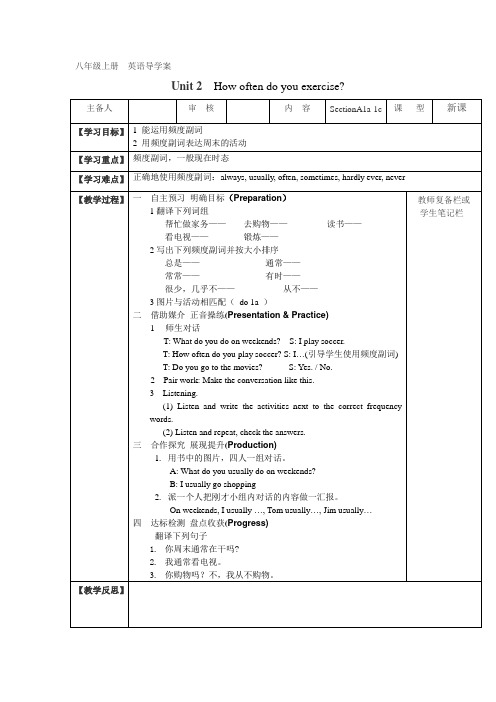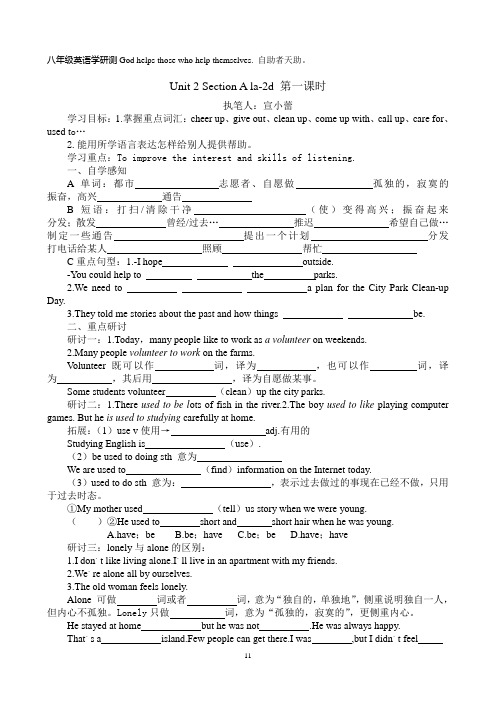八年级上 unit2 第六课时 导学案
- 格式:docx
- 大小:16.39 KB
- 文档页数:3

八年级上册导学案参考答案Unit1 Friends第一课时教学案【目标达到检测】一.二.完成句子some ’s nothing else what ,said ,honest, at all him, anything, keeps secrets for ,said, makes her sad【课后训练】一:选择填空:DCBBD BABAC二、词形变换’t frighten, be 2. are doing, am chatting look ,play,to play , to bring, have to, get , practices, dancing 8. will go, doesn’t rainUnit1 Friends第二课时教学案【预习导学】五、单词拼写.,【目标达到检测】二、词形变换be, singer, grows 2 bored, unhappy 3. glasses , him, look 4. helpful , to help, to sing 7,shorter三.1. generous 2. straight 3 funny4. knocking5. worries6. willing7. wears【课后训练】。
一、选择填空CABA D二、完形填空BAAAABACBDUnit1 Friends第三课时教学案【目标达到检测】Ⅰ.动词填空share ’t do 【课后训练】Ⅰ. 用所给单词的适当形式填空:,grows catch , carefully ,isⅡ. to , is fond long straight sense of withgood voice ,wants singer ,grows bad word ready to othersUnit 1 Grammar 第四课时教学案【目标达到检测】Ⅲ.用词的适当形式填空1.prettier most dangerous difficult most careful best largestthe tidiest【课后训练】Ⅰ单项选择BCDBADADⅡ翻译以下句子a clever girl tallest in beautiful tired better tallest the fattest of the four persons than big bananas shorter than yours longest 10 newer than mineUnit 1 第五课时教学案【目标达到检测】:一.CAEDGBF二. be when grows ’s, like kind make friends with【课后训练】一.选择CCDDCBB二. raining not travel heaviest三.BEDACUnit 1 第六课时教学案【目标达到检测】:【课后训练】一、选择填空DDCCB ABAAB BCCDA二.British 1 单元测试一.二. ABCCB DCAAB ABBCC三.CBCDA BCDAB四.with/ good sense of bad word about to people in needunhappy五.BDADDUnit 2 School life第一课时教学案答案【目标达到检测】二. 单项选择。



八年级英语学研测God helps those who help themselves. 自助者天助。
Unit 2 Section A la-2d 第一课时执笔人:宣小蕾学习目标:1.掌握重点词汇:cheer up、give out、clean up、come up with、call up、care for、used t o…2.能用所学语言表达怎样给别人提供帮助。
学习重点:To improve the interest and skills of listening.一、自学感知A单词:都市志愿者、自愿做孤独的,寂寞的振奋,高兴通告B短语:打扫/清除干净(使)变得高兴;振奋起来分发;散发曾经/过去…推迟希望自己做…制定一些通告提出一个计划分发打电话给某人照顾帮忙C重点句型:1.-I hope outside.-You could help to the parks.2.We need to a plan for the City Park Clean-up Day.3.They told me stories about the past and how things be.二、重点研讨研讨一:1.Today,many people like to work as a volunteer on weekends.2.Many people volunteer to work on the farms.V olunteer既可以作词,译为,也可以作词,译为,其后用,译为自愿做某事。
Some students volunteer (clean)up the city parks.研讨二:1.There used to be l ots of fish in the river.2.The boy used to like playing computer games. But he is used to studying carefully at home.拓展:(1)use v使用→adj.有用的Studying English is (use).(2)be used to doing sth 意为We are used to (find)information on the Internet today.(3)used to do sth 意为:,表示过去做过的事现在已经不做,只用于过去时态。

【课题】Unit5 Can you come to my party? Section A 1a-1c(1)(1课时)【学习目标】1.学会邀请别人并根据自己的安排欣然接受别人的邀请或礼貌拒绝别人的邀请。
2.能给出不能接受别人邀请的具体理由。
3.提高自己的听、说能力。
【重点,难点】掌握做出、接受和拒绝邀请的习惯用句;使用“have/has to”给出不能接受邀请的原因。
【导学指导】温故知新一、阅读课本94页“1.动词的种类”及95页上“2情态动词”,完成下列问题。
1.请在横线上罗列5个情态动词。
______________________________________________________________________________2.“must”表示“必须”,否定式缩写为________,其含义为_____________。
若表示“不必,没必要”应该使用_______________或______________。
3.He can play the piano very well.(变为否定句)He _______ play the piano very well.4.I must finish my homework today.(变为疑问句)—______ I finish my homework today?—No, you ________./____________________.二、完成1a的要求(将图片和短语匹配起来)。
然后大声朗读它们。
自主互助学习一、合上课本,试着翻译下列词组。
看看你是不是个健忘的家伙,这些短语可都是曾经的“老熟人”啊!1. 拜访我的阿姨_______________;2. 去看医生________________;3. 帮助我的父母_________;4. 上钢琴课___________________;5. 为考试学习_______________;6.在星期六下午______________。

2015年下学期黄双九年制学校初中英语组集体备课教案Unit 2How often do you exercise?第一课时 Section A (1a ~1c)§自主学习案写出下列单词。
总是 always 有时候 sometimes通常 usually 从不 never经常 often§课堂导学案Step 1 准备与热身(Preparation )Good morning! Today we shall take up the second unit in this new term: Unit 2 How often do you exercise? Please open your books at page 9.T: Look at picture a .What is she doing?S 1: She is going shopping.T: Do you usually go shopping?S 2: No, I don't.T: What do you do on weekends?S 3:I often play football.T:What do you do on weekends?S4:I sometimes go shopping.Step 2呈现与输入(Presentation)Open your book at page 9. Let's look at 1a.Each thought bubble shows something a person does on weekends. Now please look at the picture carefully and describe it.Name each activity:T:Good. Please look at the picture again and list all the activities.If you finish it first, write the answer on the blackboard.Now let's check the answers on the blackboard together.Keys:1.help with homework 2.watch TV 3.read 4.exercise 5.shopStep 3练习与体验(Practice)Look at the pictures again and tell what the person does on weekends.Good. Next, please listen to the conversation.The people are talking about what they do on weekends. First listen to the tape carefully and find how often they do on weekends.Next listen again and write the letter of one activity after the word in the list. For example, on the recording someone says,“I always go shopping.”Shopping is letter a in the picture in activity 1a.So you put an “a” after the word “always”in this list.Then listen to the tape the third time and check the answers.Step 4运用与生成(Production)After talking about the picture,we get to understand the activities.Now in pairs ask your partner about the people in the picture.A:What does he do on weekends?B:He usually watches TV.A:Does he go shopping?B:No, he never goes shopping.Step 5巩固与提高(Progress)【探究点】What do you usually do on weekends?周末你通常做什么?①该句是由what引导的特殊疑问句。
UNIT 2 What ’t the matter?一、学习目标·学会身体各部位名称的英文表达方式。
·学会表达身体的种种不适。
·掌握谈论健康并给出建议的常用句型。
三、四、教材精华SELF CHECK英汉对译①Fill in each blank with the correct word given. Change the form of the word ifnecessary. Then make your own sentence with each word.用所给单词的适当形式填空。
然后用每个单词造句。
1. I it's important to sleep eight hours a night. 我 一晚睡8个小时很重要。
2. A doctor can you medicine. 医生能 你(开)药。
3. Don't stressed out. It's not healthy. 不要 紧张,那样不利于健康。
4. I have a toothache. I to see a dentist. 我牙痛,我 看牙医。
5. Eat a balanced diet to healthy. 均衡饮食以 健康。
答案链接1. believe2. give3. get4. need5. stay② Imagine that you and Sally are on a student exchange program. Read her letter,then write back and give advice. 假设你和萨莉是交换生,读一下她的来信,然后给她回信并提出建议。
Well,I hope you're enjoying my school in New York.①I like your school in Beijing, butI'm not feeling very well at the moment.②I'm tired and have a lot of headaches. And I'm stressed out because my Putonghua isn't improving. I study late every night, sometimes until 2 am,but I don't think I'm improving.③I really need some conversation practice! I think I havea cold, too. Oh, dear! But my host family is really nice. Yesterday they...Dear Sally, I'm sorry to hear that you're not feeling well.④ I think you should...嗯,我希望你喜欢我在纽约的学校。
八年级上册英语导学案Unit 2 How often do you exercise?P eriod 1 Section A 1a-2c学习目标知识目标1,口.笔头掌握以下句型A: What do you usually do on weekends? B :I usually exercise .A: What does he do on weekends ? B:He sometimes watches TV.A:How often does he surf the Internet?B:He surfs the internet once/twice /three times a week.2熟练掌握以下词汇:exercise , hardly , ever , once , twice , time, Internet, program.3.灵活运用以what 开头的一般现在时的特殊疑问句。
4.用how often 对动作频率进行提问,并掌握其答语。
技能目标:听懂用一般现在时谈论人们经常做某事的对话并熟练运用目标句型进行会话。
情感态度:通过学习,培养健康意识及良好的生活习惯。
[来源:学。
科。
网]课前准备I.将下列单词根据词义按照频率由高到低排列出来,并且译为中文.hardly ever,sometimes ,always ,often,usually,never100%,_______( ),_______________ ( ),_______ ______( ), _______( ),________________( ),_____________ ( ),0%II.翻译词组.watch TV_________________ go shopping _________________r ead a book _____________ exercise___________________III.列举你在周末通常做的活动。
Unit2:How often do you exercise? 导学案Unit A一、词汇、短语、句型默写(课后默写)1、家务2、几乎不3、从来、曾经4、几乎从不5、一次,曾经6、两次、两倍7、互联网8、节目9、满的、充满的10、摆动、秋千其过去式是11、摇摆舞12、或许、可能13、最小(的)、最少(的)14、至少、不少于15、多久一次16、锻炼17、帮助18、在周末19、去看电影20、看电视21、去购物22、你最喜欢的节目23、看英语书24、下个星期25、上舞蹈和钢琴课26、哪种舞蹈27、一个月一次28、打网球29、熬夜30、吃早餐31、吃一顿健康的早餐32、运动33、早点睡觉34、放学后二、课文知识讲练(一)1、how often意思是“多久一次”,用来问时间频率。
(1)always(总是)、usually(通常)、often(经常)、sometimes(有时)、seldom(很少)、hardly ever(几乎不)、never(从不)这些都是频度副词,放在助动词或情态动词后,谓语动词前面;sometimes也可以位于句首或句尾。
(2)every+时间,once a week (一星期一次),twice a month (一个月两次),three times a year (一年三次)、four times a month (一个月四次)等这些都是表示时间频率,一般放在句尾。
2、how long 意思是“多久、多长”,用来问物体长度或时间的长短。
3、how soon意思是“多久”,用来问“in+一段时间”这种将来的时间结构。
4、how far意思是“多远”,用来问路程,距离。
5、how many 意思是“多少”,问可数名词的数量。
(1)will your father come back ? In two days .(2)do you do exercise ? Every day .(3)did it take you to get there ? About half an hour .(4)is it from here to your home ? About two kilometers .(5)is it from? Ten minutes’ walk .(6)do you run every week ? Three times .(7)do you run ? Three times a week .(二)、exercise :1、意思是“锻炼”,是动词和不可数名词,do exercise “锻炼”。
Unit2 What’s the matter?主备人:XXX 审稿人:八年级英语教师审批_______Sept.10,2011单元目标:一、知识与技能:1.学会使用教材词汇表中的黑体单词。
2.学会使用描述健康状况和提出合理的建议。
3.学会就健康问题展开讨论,并用You should ……的句型提出解决方法。
4.能以书信的形式针对某种健康情况提出建议。
二、方法与过程:以自学为主,运用小组交流,师生合作、生生合作的学习方法,以记忆和口语交流为主,伴随听力和阅读写作训练。
三、情感态度与价值观:通过本单元的学习,培养学生的健康意识,如何预防健康问题,从而教育学生健康的身体是搞好学习的前提。
第1课时学习内容:Section A 1a-Grammar Focus,(P7-8)学习目标:一、词汇目标:1、matter n 事情问题差错a lot of matters许多事It doesn’t matter. (v.)没关系。
What’s the matter/ trouble with you?What’s wrong with you ?你怎么了?What’s your trouble ?What’s up with you?Is there anything wrong with you ?Is something wrong with you?注意:What’s wrong with…? 某物出了什么故障?----What’s wrong with your watch? ---- It doesn’t work.你的表出了什么毛病?坏了。
2. have a cold 患感冒have a bad cold 患重感冒---- What’s wrong with you? ---- I have a bad cold .---- How are you feeling now ? ---- I’m feeling much better.3. stomachache 胃痛,腹痛,肚子痛have a stomachache 胃痛= have a pain in the stomach =have a sore stomachhave a bad stomachache 胃痛得厉害4. sore adj 疼痛的,酸痛的throat 喉咙烟喉have a sore throat 烟喉痛There’s something wrong with my throat.我烟喉有毛病。
八年级英语学科导学案
编写人:初审人:审核人:使用时间:第六课时Unit 2 How often do you exercise ? Section B3a-self check
班级:______ 姓名:__________ 【使用说明及学法指导】
1. 学生个人课前以预习案内容为主 朗读并记忆四会单词的意义及用法。
2. 找出本节课要学到的有关短语 两人英汉互译合作记忆。
3. 探究案以两人或小组合作学习为主解决 有争议或无法确定的内容教师辅助解决。
4. 训练案当堂完成 学生分层次进行对改展示 教师适当进行点拨和指导。
5. 我的收获由学生和教师分别完成 对本节课做简要总结 以利改进和提高。
【学习目标】
一.知识目标:学习并掌握词汇:visit the zoos, take some photos, go to the countryside 学习目标语言:How was the trip? It was …
二.能力目标:学会写日记。
三.情感目标:通过对旅行的回忆来更加热爱生活。
重难点:学会写日记。
【预习案】
一.已学知识回顾
()1. We got ______ when we heard the ______ news.
A. excited; exciting
B. excited; excited
C. exciting; excited
()2. Jim is a very _____ person and we are ______ in his story.
A. interested; interesting
B. interesting; interested
C. interested; interested
()3. He ______ one of ______friends at the station yesterday afternoon.
A. saw; him
B. saw; his
C. sees; his
()4.—How was your school trip?
—Pretty good! We ______the history museum.
A. visit
B. visited
C. will visit
()5.Pardon? I ______ hear you. A. don’t B. didn’t C. can’t 二.预习指导
1. 根据图片和文章等,预测新课内容;
2. 自学课文,完成Self Check中的练习。
三.自我检测
翻译官
1.参观动物园_____________________
2.拍照______________________
3.去乡下____________________________
4.了解_____________________
5.对……感兴趣_____________________
6.gift shop ____________
7.feed chickens ________8.fire station _______ 9.all in all ________ 10.ride a horse ______
【探究案】
Step1 Review & Lead-in
1. Read 2b on P65 together.
2. Write more verbs and their past forms in each group. Finish Self Check:
Ex.1. Then give a summary about it.
3. Finish Self Check: Ex.2: Complete the conversations with the correct
forms of the verbs in the box.
Step2 Presentation
1. Look at the pictures in 3a. What are they doing in each picture?
2. Complete Bob’s diary entry. Finish 3a. Check the answers.
3. Complete Bob’s classmate Linda’s diary entry. Finish 3b. Check the answers.
4. Read the two diary entries together.
Step3 Writing Now write a diary entry for your own school trip. Explain if you liked it and why.
Group work: 动词一般过去时的变化规则(课本P114)。
Notes:________________________________________________________ ________________________________________________________
【当堂检测】
一.根据要求完成句子。
1. I had some friends. (改为一般疑问句)______ you ______ ______ friends?
2. Sally often did some reading in the morning last year. (改为否定句)
Sally ______ often ______ some reading in the morning last year.
3. I don’t think he is an artist. (改为一般过去时态)I ______ think he ______ an artist.
4. Were they at home?(作出肯定回答)Yes, ______ ______.
5. Did you have dinner?(作出否定回答)No,______ ______.
二.用括号内单词的正确形式填空。
1. _______ you ______ (watch) TV yesterday?
2. He _________ (play) tennis an hour ago.
3. Tom knew a lot about __________ (farm) in the village.
4. Sally ____________ (not study) here last month.
5. She ___________ (write) a new story yesterday.
6. She said she was _____________ (interest) in art.
三. 根据汉语提示完成句子。
1. Tom的周末怎么样?
__________ _________ Tom’s weekend?
2. 你给奶牛挤过奶吗?
Did you _________ a _________?
3. 去年我经常钓鱼、喂养小动物。
I often _________ fishing and __________ little animals last year.
4. 这些可爱的礼物是给他准备的。
These _________ _________ were for him.
5. 他对价格便宜的东西很感兴趣。
He’s ___________ in the __________ things.
【我的收获】:
_______________________________________________________________________________ _______________________________________________________________________________。